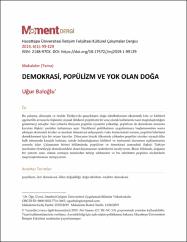| dc.contributor.author | Baloğlu, Uğur | |
| dc.date.accessioned | 2023-11-26T15:39:12Z | |
| dc.date.available | 2023-11-26T15:39:12Z | |
| dc.date.issued | 2019 | en_US |
| dc.identifier.issn | 2148-970X | |
| dc.identifier.uri | https://hdl.handle.net/11363/6509 | |
| dc.description.abstract | Bu çalışma, dünyada ve özelde Türkiye’de gerçekleşen doğa tahribatlarının ekonomik kriz ve kültürel
egemenlik arzusu ile ilişkisini, siyasal iktidarın popülizmi bir araç olarak kullanarak nasıl meşrulaştırdığını
göstermeyi amaçlar. Son yıllarda dünyada popülist siyasetin yükselişi, popülizm ile demokrasi arasında
kurulan ilişkiyi yeniden tartışmaya açar. Neoliberal politikaların uygulanmaya başlamasından sonra
sıklaşan ekonomik krizler ve modern demokrasi anlayışında vuku bulan temsil sorunu, popülist liderlerin
desteklenmesi için bir ortam hazırlar. Dünyanın birçok ülkesinde yükselen popülist otoriter siyasal dilin
halk tabanında karşılık bulması, içinde bulunduğumuz kültürel ve toplumsal durumun açıklanmasını
zorunlu kılar. Çalışmanın birinci bölümünde, popülizm ve demokrasi arasındaki ilişkiyi Türkiye
üzerinden örnekleyip demokrasideki eksen kaymasının nedenlerini inceliyorum. İkinci bölümde, doğanın
bir yatırım aracı olarak sermaye tarafından tahrip edilmesini ve bu tahribatın popülist söylemlerle
meşrulaştırılmasını tartışıyorum. | en_US |
| dc.description.abstract | In this article, it is aimed to show how to legitimize the relationship between the economic crisis and the
desire for cultural sovereignty of the nature of the damage in the world, particularly in Turkey, by using
populism as an instrument of political power. In recent years, the rise of populist politics in the world
brings the relationship between populism and democracy up for discussion. The increasing economic crises
after the neoliberal policies and the problem of representation in modern democracy provides an
environment for the support of populist leaders. The populist authoritarian political language, which is
rising in many countries of the world, supporting by the public requires the explanation of the cultural and
social situation. In the first part of the study, I examine the causes of the axial dislocation in democracy by
sampling via Turkey to the relationship between populism and democracy. In the second part, I argue that
nature is destroyed by capital as an investment instrument and this is legitimated by populist rhetoric. | en_US |
| dc.language.iso | tur | en_US |
| dc.publisher | Hacettepe Üniversitesi İletişim Fakültesi | en_US |
| dc.relation.isversionof | https://doi.org/10.17572//mj2019.1.99129 | en_US |
| dc.rights | info:eu-repo/semantics/openAccess | en_US |
| dc.subject | popülizm | en_US |
| dc.subject | ileri demokrasi | en_US |
| dc.subject | iklim değişikliği | en_US |
| dc.subject | doğa tahribatı | en_US |
| dc.subject | totaliter demokrasi | en_US |
| dc.subject | populism | en_US |
| dc.subject | advanced democracy | en_US |
| dc.subject | climate change | en_US |
| dc.subject | destruction of nature | en_US |
| dc.subject | totalitarian democracy | en_US |
| dc.title | Demokrasi, Popülizm ve Yok Olan Doğa | en_US |
| dc.title.alternative | Democracy, Populism and Extinction of Nature | en_US |
| dc.type | article | en_US |
| dc.relation.ispartof | Moment Dergi | en_US |
| dc.department | Uygulamalı Bilimler Yüksekokulu | en_US |
| dc.authorid | 0000-0002-7716-3663 | en_US |
| dc.identifier.volume | 6 | en_US |
| dc.identifier.issue | 1 | en_US |
| dc.identifier.startpage | 99 | en_US |
| dc.identifier.endpage | 129 | en_US |
| dc.relation.publicationcategory | Makale - Ulusal Hakemli Dergi - Kurum Öğretim Elemanı | en_US |
| dc.contributor.institutionauthor | Baloğlu, Uğur | |

















